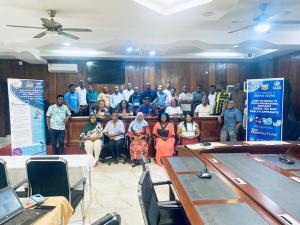Sierra Leone boosts AMR surveillance with WHONET and GLASS training
Bo district, 31 July: Antimicrobial resistance (AMR) continues to pose a serious public health threat globally, undermining the effective treatment of infections in humans and animals. In response, the Ministry of Health, with support from the World Health Organization (WHO), the Food and Agriculture Organization (FAO), and funding from the Fleming Fund, conducted a four-day national training workshop from 28–31 July 2025 in Bo district to strengthen AMR surveillance systems in Sierra Leone.
The training focused on building the capacity of laboratory personnel from both human and animal health sectors, as well as members of the National Coordinating Committee (NCC), in the use of WHONET software and the WHO Global Antimicrobial Resistance Surveillance System (GLASS). This effort forms part of Sierra Leone’s broader commitment to the One Health approach, ensuring cross-sector collaboration in monitoring AMR trends.
“Building local capacity to use WHONET, interpret antibiograms and submission to GLASS is not just about software, it’s about empowering laboratories to generate and submit actionable data that saves lives,” said WHO Microbiologist, Dr Antoinette Ngandjio.
Participants received hands-on training on WHONET data entry, analysis, and visualization of resistance patterns, including the use of BacLink to import AMR data from common Laboratory Information Management Systems (LIMS) and automated systems. They also learned how to validate and submit AMR data to GLASS in line with global reporting standards.
FAO Laboratory Scientist Kululeko Dube emphasized the importance of intersectoral cooperation: “The One Health dimension of AMR surveillance cannot be overstated. This workshop highlights the need for consistent collaboration between human and animal health laboratories in producing reliable data.”
The training was practical and interactive, allowing participants to apply what they learned to simulated datasets and real-life scenarios. “Before this training, we struggled with fragmented AMR data. Now, we are confident in our ability to generate, clean, and report high-quality data that will inform treatment and policy decisions,” said Sorio I. O. Bangura, Laboratory Scientist at the Ministry of Health.
Remote support was provided by WHONET developer John Stelling, who noted, “It’s been a privilege to support Sierra Leone’s laboratory network. Your progress in data cleaning and submission reflects a commitment to quality, collaboration, and global health security.”
The training marks a pivotal step in Sierra Leone’s AMR response, equipping key health actors with the tools and skills necessary to contribute to a harmonized, data-driven surveillance system that supports national and global health priorities.



